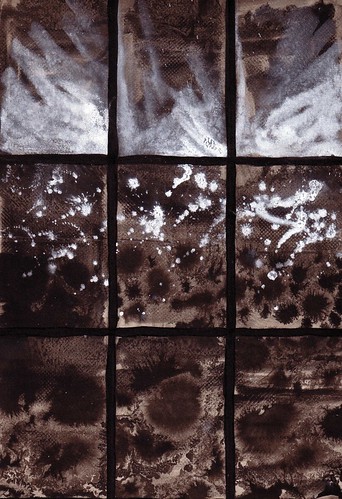
Posted by Martin Hand as part of a set of artworks by Steve Whitaker (1955-2008), probably best know as the colorist on V for Vendetta. (None of the other pieces are abstract, by the way.) Found via Kent Worcester.
If this is actually from the '80s (Hand puts a question mark after the date), it's the first proof I have of Warren Ellis's claim, upon first seeing my pieces in 2006, that "British minicomics were full of this kind of experimentation in the 80s, and I don't see a lot that's new here." (By the way, that whole thread is worth reading, as a case study if nothing else. And thanks, Jacob!) If anybody has other examples of 80s British abstract comics, please let me know and I'll post them here.

Grrr. I lost the longer comment,and I don't have the wherewithal to repeat it. The image is beautiful.
ReplyDeleteThe link to the conversation is also very interesting. I am fascinated by how far we've come in a relatively short time. The responses to your 2006 work are much less sophisticated than the general reception of the AC anthology in 2009. Or at least, the reviews I've read of AC seem more substantive and (relatively) more sophisticated, even when they offer criticisms.
I had more making a connection between the kind of arguments made against your work in the linked discussion forum and the response we get in talk-back sessions to experimental performance work. I won't try to reconstruct it. Suffice it to say, there's always a crowd who resent theatre that isn't primarily entertaining and who are reluctant to consider their received expectations for what performance should be.
okay, so apparently I was wrong about my lost comment. how experimental is that???
ReplyDeleteNow we have a choice to read either the long version or the abstract (so to speak).
ReplyDeleteNice piece, but if we begin to play the date game, I was doing such stuff in the early 80s, like 1980. And I'll bet others here were too. It's the quality, not the "got there first" thing anymore anyway.
ReplyDeleteIt's not a matter of playing the date game, Mark, I just would like to see those comics that Warren Ellis mentioned... When he first posted that comment I remember asking around and getting no results.
ReplyDeleteI meant on his part, not yours --- his (or anyone?s) saying "nothing new" --- I don't see the AbstrComics thing as about that at all.
ReplyDeleteThank you for reproducing the work of my late friend Steve Whitaker. Steve trained as a fine artist at Chelsea School of Art, London, in the 1970s - among his contemporaries there were the artist Jake Tilson, with whom Steve worked on two arts magazines, CIPHER and ATLAS, and the comics and storyboard illustrator/designer Brendan McCarthy. The work that Steve produced at Chelsea was, in the main, within the abstract expressionist tradition, often painted onto large, irregular chunks of wood.
ReplyDeleteDuring the 1980s and 1990s, Steve earned his living primarily as a comics colourist (his most famous credit is undoubtedly the DC version of Moore and Lloyd's V FOR VENDETTA, but perhaps my favourite colouring job of his is the daring, collage-laden work that he and Nick Abadzis produced for Grant Morrison and Steve Yeowell's NEW ADVENTURES OF HITLER strip in CRISIS magazine.) Steve's flat/studio space would usually be littered with pages and pages of sketches, notes and colour tests. Quite often, pieces of paper where Steve had wiped his brush or mixed different colour dyes would be transformed into works of art in their own right, even spawning a series of abstract images that he dubbed 'Jellytown'. I don't know for certain, but I'm pretty sure that the page reproduced above is a similarly 'worked over' sheet that became a discrete abstract narrative during the process.
Steve is much missed by his friends, some two years after his passing, but his fellow artists Martin Hand and Matt Brooker, amongst others, are doing much to keep his work and his memory alive.